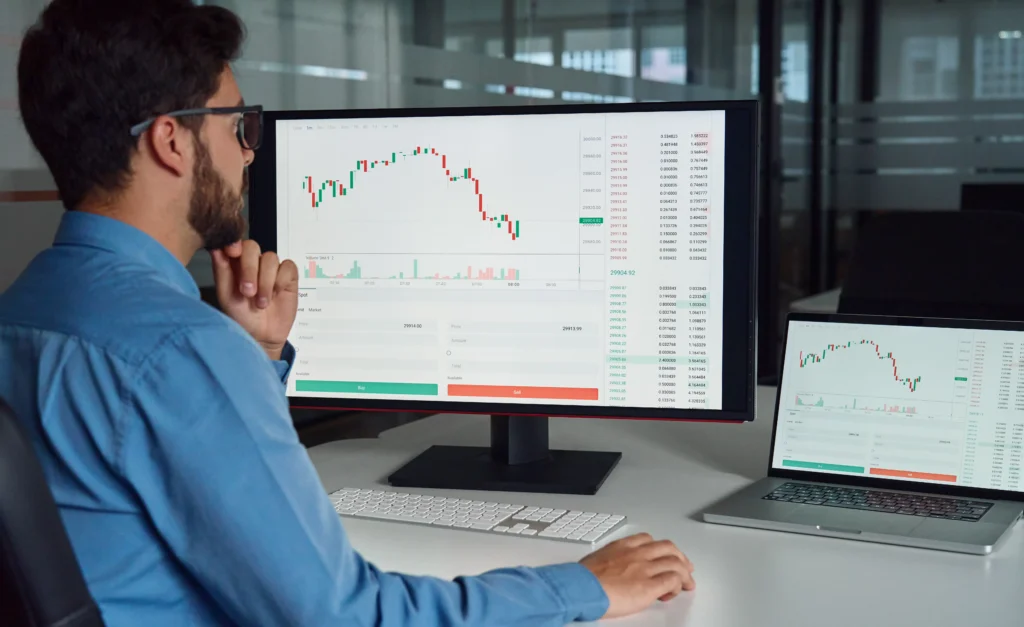In the fast-moving world of Forex and stock trading, overtrading is one of the most silent yet devastating mistakes traders make. It’s not always about losing trades — it’s about losing focus, patience, and discipline. Overtrading occurs when you take excessive trades without a valid reason, often driven by emotion, impulse, or the desire to recover losses quickly.
Professional traders plan every move around logic, market conditions, and defined setups. Overtraders, however, constantly chase opportunities— entering trades without structure, confidence, or analysis. The result is usually the same: higher stress, faster losses, and declining performance.
Recognising early signs of overtrading can save you from emotional burnout and financial drain. Below are six red flags— and proven ways to stop them before they damage your account.
1. You’re Trading Every Market Move
The first clear sign of overtrading is when you can’t resist entering the market every few minutes. Whether it’s a minor price fluctuation, news announcement, or a random candle pattern — you feel compelled to trade.
This behaviour often stems from FOMO (fear of missing out) and the belief that constant activity equals progress. In reality, frequent trading dilutes your analysis. When you take every possible setup, you lose selectivity— and selectivity is what defines successful traders.
For example, during the 2024 U.S. inflation data release, many short-term traders opened multiple positions on EUR/USD within minutes, chasing volatility. Most were stopped out due to slippage and erratic moves. Those who waited for confirmation after the spike captured the real trend calmly.
How to fix it:
Focus on only high-probability setups that align with your plan. Define your ideal trading conditions—time frame, confirmation, and trend direction— and ignore everything else. Discipline outperforms activity in the long run.
2. You’re Glued to the Charts All Day
If you spend endless hours staring at your screen, waiting for something to happen, you’re not analysing—you’re overtrading. Many traders mistakenly believe that more screen time means better results, but in reality, it usually leads to emotional fatigue, rushed decisions, and frustration.
Overtrading in Forex often begins with good intentions. You want to stay informed, track every tick, and catch every move. But the human brain can only maintain focus for so long before exhaustion sets in. When you overanalyse, your mind starts seeing patterns that aren’t there. You convince yourself that every price flicker is a trading opportunity, which leads to impulsive entries and losses.
Consider how professionals manage time during the most active Forex sessions. The London and New York overlap is highly volatile, yet experienced traders don’t watch every minute. They set alerts, plan levels, and wait for specific confirmations before acting. Overtraders, however, sit for hours chasing micro-movements, wasting mental energy.
How to fix it:
Create structured trading sessions. Analyse markets at scheduled intervals, such as once every two or three hours, and use alerts for key levels. This prevents chart addiction and preserves focus. Approach trading with a business mindset: establish work hours, implement your plan, and conclude your activities when finished. Long-term consistency comes from clarity, not constant activity.
3. You’re Increasing Lot Sizes Without Logic
Nothing exposes overtrading behaviour more quickly than reckless position sizing. If your lot sizes fluctuate after every win or loss, it’s a sign you’re reacting emotionally instead of following strategy.
Traders often succumb to this trap after experiencing rapid profits. The excitement from a winning streak creates false confidence. You start believing that larger trades will double your success. But trading bigger without proven consistency multiplies your risk, not your reward.
For example, during the 2025 EUR/JPY rally, many retail traders increased lot sizes drastically after small wins, expecting a non-stop uptrend. A sudden pullback erased their gains within hours. It wasn’t the market’s fault—it was poor leverage control combined with emotional overconfidence.
Why it’s dangerous:
When you risk more after every win, you give back profits faster than you earned them. If you increase size after a loss, you enter the revenge trading zone, where logic disappears and losses spiral.
How to fix it:
Use a fixed-percentage risk model. Risk only one to two per cent of your equity per trade, regardless of confidence. Record your position sizes in a trading journal to maintain consistency. Stability in lot sizing promotes discipline and smooth equity growth, while emotional scaling destroys both.
4. You’re Ignoring or Changing Your Trading Plan
Having a trading plan means nothing if you don’t follow it. When you skip confirmations, move stop-loss levels, or close trades prematurely, you’re trading emotions—not strategy. Such behaviour is one of the clearest signs of overtrading and often the most destructive.
A trading plan exists to minimise emotional interference. Every deviation weakens its purpose. You might think you’re adapting to the market, but in reality, you’re losing consistency. Over time, these impulsive changes make it impossible to measure performance or identify what truly works.
A 2024 Myfxbook analysis found that traders who broke their rules in more than 30 per cent of trades experienced 40 per cent higher drawdowns compared to those who stayed disciplined. Overconfidence after a few wins often causes this behaviour—confidence turns into carelessness.
How to fix it:
Revisit your plan every week. Before placing a trade, ask yourself, “Does this setup meet my strategy?” If not, skip it, no matter how tempting it looks. Keep your trading checklist visible at all times. Discipline isn’t about control; it’s about building consistency. Trading less but smarter helps protect both your capital and your confidence.
5. You Feel Emotionally Exhausted After Every Session
Overtrading in Forex is not just a technical mistake—it’s a psychological one. When your emotions swing after every win or loss, you’re draining your emotional capital faster than your financial capital.
Each trade you take triggers a stress response. When trades pile up, so does emotional pressure. Excitement from wins and frustration from losses form a dangerous loop of reactive decision-making. Soon, you start entering trades out of boredom or anger, not strategy.
Research from multiple brokers between 2023 and 2024 revealed that traders who executed more than 15 trades per day earned 25 per cent less profit annually compared to those who took fewer, well-planned trades. The difference wasn’t skill—it was mental fatigue.
How to fix it:
Set a daily trade limit. Two or three high-quality setups per session are more than enough. Keep a journal to record how you feel before and after each trade. Over time, you’ll recognise emotional triggers that lead to poor decisions. Introduce regular breaks to reset your focus. Even a short walk or deep-breathing exercise helps restore clarity. Remember, the goal is to think calmly, not trade constantly.
6. Your Account Balance Swings Wildly
Large fluctuations in your account balance are a warning sign that your trading approach lacks control. If your equity curve looks like a roller coaster—up 10 per cent one week and down 12 per cent the next—you’re overtrading.
Inconsistent exposure and poor risk management create volatile account movements. Instead of compounding steadily, you experience chaotic growth followed by steep losses. Professionals focus on risk-adjusted returns, where small, consistent profits matter more than big, unstable wins.
Consider this: hedge funds rarely allow more than one to two per cent monthly drawdowns because they prioritise long-term sustainability. Retail traders, by contrast, often face double-digit swings weekly due to frequent trades and high leverage. That volatility doesn’t indicate skill—it indicates a lack of structure.
How to fix it:
Audit your performance weekly. Identify which trades were unnecessary or taken outside your plan. Track your risk exposure, win rate, and emotional state. Reduce position sizes and avoid overlapping trades in correlated pairs. Aim for a smoother equity curve that grows steadily over time. True success in trading isn’t about making the most in a week—it’s about staying consistent month after month.
How to Stop Overtrading Quickly
Stopping overtrading is about regaining structure, not avoiding the market. Successful traders operate within systems that limit emotion and maximise logic. When you build rules around trade frequency, timing, and mindset, your decisions become more deliberate and far more profitable.
Set a Trade Limit
Please determine the exact number of trades you plan to execute in a day or week, and then commit to that decision. Limiting your trading frequency forces you to focus only on high-probability setups. For example, many professional traders take two or three well-planned trades daily, each backed by confluence and risk control. This habit builds patience and filters out low-quality impulses.
Use Alerts Instead of Watching Charts
Endless chart-watching leads to fatigue and emotional trades. Instead, set price alerts on your platform so technology notifies you when the price reaches your pre-defined levels. This keeps your attention sharp and your screen time productive.
Establish a Cool-Off Rule
If you lose three trades consecutively, stop for the day. A short break prevents revenge trading and restores mental clarity. Even hedge fund traders use pause limits to protect emotional discipline.
Identify Emotional Triggers
Recognise what pushes you to overtrade — boredom, excitement, or stress. Replace those triggers with structured activities such as reviewing journal entries, back-testing, or reading market analysis.
Reward Discipline, Not activity.
A profitable trading day is not defined by the number of trades but by the quality of decisions. A day with zero trades can still be a victory if you followed your rules.
Review Weekly Data
Analyse your trading logs every week. Note when overtrading happens most often and how it affects performance. Please adjust your strategy and schedule as needed.
The key to stopping overtrading lies in conscious control, not restriction. The market always rewards patience, structure, and consistency over impulse.
Final Thoughts
Overtrading may feel like progress, but it creates confusion, stress, and burnout. The constant urge to enter trades gives a false sense of productivity while silently destroying focus and discipline. Every second the market moves, yet the most successful traders understand that real power lies in patience, not constant activity.
When you stop chasing every price movement, you start thinking clearly. Each trade becomes strategic, not emotional. You no longer trade to feel busy — you trade because your setup, plan, and logic align perfectly. That shift marks the beginning of professional growth.
Trading less but smarter helps you stay calm under pressure, protect your capital, and develop the patience needed for long-term success. The market always rewards consistency, self-control, and clarity. Once you replace emotional trading with structured decisions, you gain stability, confidence, and peace of mind — the true hallmarks of a disciplined trader.
Key Takeaways
- Overtrading destroys consistency by forcing emotional and impulsive trades.
- Patience is a trading skill, not a weakness. Waiting for high-probability setups builds confidence and precision.
- Trading discipline matters more than frequency. Fewer, well-planned trades often generate stronger results.
- Emotions drive overtrading. Recognising triggers like boredom, fear, or greed precludes reckless decisions.
- Structure creates success. A written trading plan, daily limits, and fixed risk rules maintain clarity.
- Smart trading equals longevity. Sustainable habits protect both your capital and your mindset.
Frequently Asked Questions (FAQ)
1. What is overtrading?
Overtrading happens when traders take too many trades without clear logic or discipline, often driven by emotion rather than analysis.
2. Why is overtrading harmful?
It leads to poor decision-making, emotional stress, and account drawdowns. Frequent trading reduces accuracy and increases transaction costs.
3. How can I stop overtrading?
Create a structured trading plan, set a daily trade limit, use alerts, and review your performance weekly to track behaviour patterns.
4. Can emotional control prevent overtrading?
Yes. Recognising your emotional state before making trades reduces impulsive decisions and keeps your actions logical.
5. What’s the best long-term strategy to avoid overtrading?
Focus on quality setups, fixed risk per trade, and a consistent review process. The goal is not more , but better trades.
Read here to learn more about “11 Best Timeframes to Use Technical Indicators for Traders 2025“




